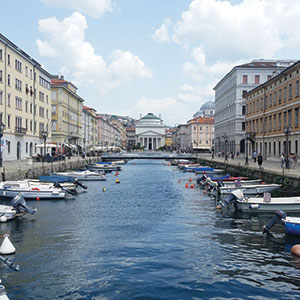

The author James Joyce harbored a love-hate relationship with his hometown of Dublin, so he exiled himself to Trieste, a city at the tip of the Adriatic Sea, in what’s now Italy. Since I’ve already written about Joyce’s birthplace and gravesite, Trieste was the next logical destination.
Although Trieste is where Joyce wrote Portrait of the Artist as a Young Man, as well as The Dubliners and significant portions of Ulysses, he was not the only one whose ghost began to follow me around.
An unapologetically trans-ethnic type of place, Trieste was for centuries the main port city of the Austro-Hungarian Empire. After World War I, it became part of Italy. After World War II, it became a free independent territory administered in two different zones, one run by the Americans and the British, the other run by Tito’s Yugoslavia. Then, in 1954, the two zones were split, with the northern zone going back to Italythe current-day Triesteand the rest going to Tito, but an area that’s now part of Slovenia and part of Croatia. All of which forced generations to migrate every which direction, resulting in progressively unclassifiable flavors of nostalgia and identity. By today’s geography, this is an area where Italy, Austria and Slovenia all bleed into each other with borders that make no sense to anyone. You meet Italian nationals with Slavic names or Slovenes whose mother tongue is Italian. You meet people longing for Austria who were never even Austrian and there even exist people fighting to bring back the independent Trieste.
The travel writer Jan Morris referred to Trieste’s “idiosyncratic cosmopolitanism” and how it exists in a state of “permanent hiatus,” terms I just love because the city seems to operate outside the linear passage of history in regards to the ways that cities are normally defined by language, authority, allegiances or relationships to larger regions. In fact, while exploring Trieste one immediately realizes the sheer idiocy of defining anyone’s identity solely by nation-states or borders because such a perspective simply can’t apply to Trieste. Today the city effortlessly embroiders threads of Italian, Slavic and Germanic history, as well as the politics, religion and architecture of all those demographics. It is a city where everyone’s identity is formerly a part of some other identity, a place simultaneously everything and yet somehow existing between everything, a multidimensional space of intersecting transitions. It’s also a coffee capital and still a major port city.
Pulled along by the flow, I walked throughout the city over the course of a few days, but James Joyce was not the only author haunting me. There were many more.
Sir Richard Francis Burton, the 19th-century explorer and blasphemous troublemaker, lived in Trieste, working as the British consulate when he translated The Kama Sutra and The Arabian Nights. While a wealth of markers and itineraries exist to re-imagine Joyce’s time in Trieste, practically nothing remains of Burton’s life. Nor does hardly anything remain of the provocative French novelist Stendhal, who briefly operated in Trieste, working as the French consulate.
But here’s what blew me away the most. The American diplomat Alexander Wheelock Thayer wrote the first definitive biography of Beethoven, working on much of it while serving as the U.S. consulate in Trieste, likewise in the 19th century. Thayer is even buried nearby. In yet another example of synchronicity as cosmic performance art, I found out right before I traveled to Italy that Thayer’s old passport, some of his correspondence, letters and artifacts, as well as his uniform from when he served as U.S. consul in Trieste, including his jacket, pants, gloves, hat and sword, are stored in the vault at the Beethoven Center at San Jose State University, in my own neighborhood, right down the street from where I live, a facility inseparable from my alma mater, the SJSU Music Department.
As a result of such spacetime continuum-shattering vibrations, I can safely say that walking around in Trieste for a few days made me want to be an international diplomat. I must have a future in foreign service. I wouldn’t wear a uniform, but someday my clothes will also be acquired by the Beethoven Center. Long live an international Trieste!



